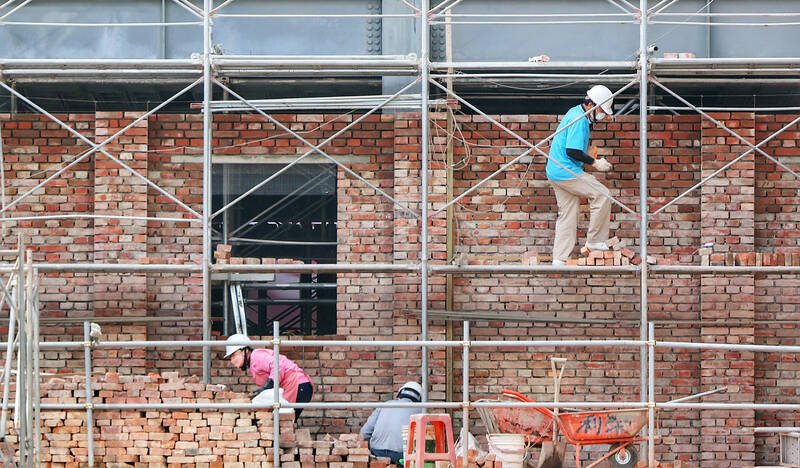Property transactions in the six special municipalities last month totaled 21,368 units, spiking 33.7 percent from one month earlier, driven by people with real demand and new housing completions, brokers said yesterday.
The rebound approached 30 percent in Taipei to 2,553 deals, and climbed even faster in New Taipei City, Taoyuan, Taichung and Kaohsiung, data from respective local governments showed.
Taiwan Realty Co (台灣房屋) research head Charlene Chang (張旭嵐) attributed the pickup to five more working days last month compared with April, as well as new housing deliveries.

Photo: CNA
“People with real demand took action after expectations that housing prices would decline failed to realize,” Chang said.
The absence of new unfavorable policy measures spurred buyers to quit waiting and join the market, the analyst said.
New Taipei City posted the biggest month-on-month gain of 43.9 percent to 5,562 deals, followed by a 40.3 percent increase to 3,724 units in Taoyuan.
Transactions in Taichung registered a 32.4 percent jump to 4,052 units and advanced 34 percent to 3,525 deals in Kaohsiung. Tainan was relatively calm with 8.7 percent growth to 1,952 deals.
The unease linked to the bans on transfers of presale house purchase contracts subsided last month, Evertrust Rehouse Co (永慶房屋) said.
Furthermore, new housing delivery accounted for transaction advances in New Taipei City’s Sinjhuang (新莊), Sanchong (三重) and Sijhih (汐止) districts, as well as Taoyuan’s Longtan (龍潭) and Jhongli (中壢) districts, Evertrust Rehouse deputy research manager Chen Chin-ping (陳金萍) said.
However, it would be too early to paint the rebound as a sustained recovery as the transaction volume shrank 6.4 percent compared with a year earlier, Chen said.
Cumulative deals in the first five months of the year tumbled 21.4 percent year-on-year to 86,640 units for the six special municipalities, Chen added.
Great Home Realty Co (大家房屋) head researcher Mandy Lang (郎美囡) was also cautious, saying buyers and sellers remained at loggerheads over housing prices, which could slow transactions.
Additionally, the rebound would come to a halt if the central bank raises interest rates again later this month, H&B Realty Co (住商不動產) said.
The central bank is to review its monetary policy on June 15.

Intel Corp chief executive officer Lip-Bu Tan (陳立武) is expected to meet with Taiwanese suppliers next month in conjunction with the opening of the Computex Taipei trade show, supply chain sources said on Monday. The visit, the first for Tan to Taiwan since assuming his new post last month, would be aimed at enhancing Intel’s ties with suppliers in Taiwan as he attempts to help turn around the struggling US chipmaker, the sources said. Tan is to hold a banquet to celebrate Intel’s 40-year presence in Taiwan before Computex opens on May 20 and invite dozens of Taiwanese suppliers to exchange views

Application-specific integrated circuit designer Faraday Technology Corp (智原) yesterday said that although revenue this quarter would decline 30 percent from last quarter, it retained its full-year forecast of revenue growth of 100 percent. The company attributed the quarterly drop to a slowdown in customers’ production of chips using Faraday’s advanced packaging technology. The company is still confident about its revenue growth this year, given its strong “design-win” — or the projects it won to help customers design their chips, Faraday president Steve Wang (王國雍) told an online earnings conference. “The design-win this year is better than we expected. We believe we will win

Chizuko Kimura has become the first female sushi chef in the world to win a Michelin star, fulfilling a promise she made to her dying husband to continue his legacy. The 54-year-old Japanese chef regained the Michelin star her late husband, Shunei Kimura, won three years ago for their Sushi Shunei restaurant in Paris. For Shunei Kimura, the star was a dream come true. However, the joy was short-lived. He died from cancer just three months later in June 2022. He was 65. The following year, the restaurant in the heart of Montmartre lost its star rating. Chizuko Kimura insisted that the new star is still down

While China’s leaders use their economic and political might to fight US President Donald Trump’s trade war “to the end,” its army of social media soldiers are embarking on a more humorous campaign online. Trump’s tariff blitz has seen Washington and Beijing impose eye-watering duties on imports from the other, fanning a standoff between the economic superpowers that has sparked global recession fears and sent markets into a tailspin. Trump says his policy is a response to years of being “ripped off” by other countries and aims to bring manufacturing to the US, forcing companies to employ US workers. However, China’s online warriors